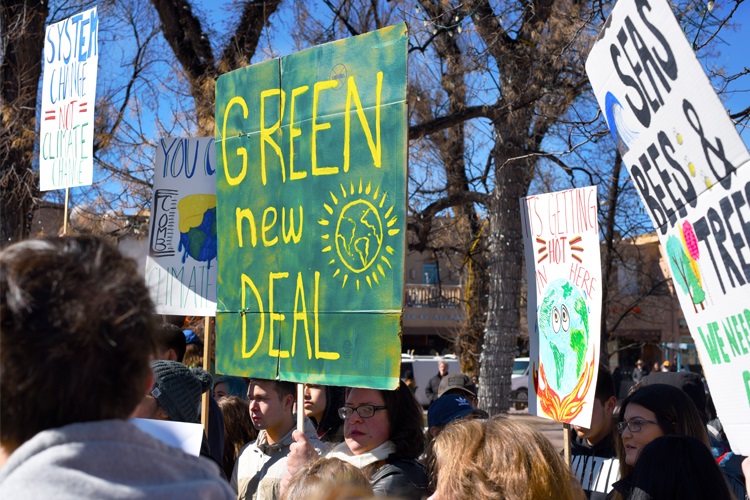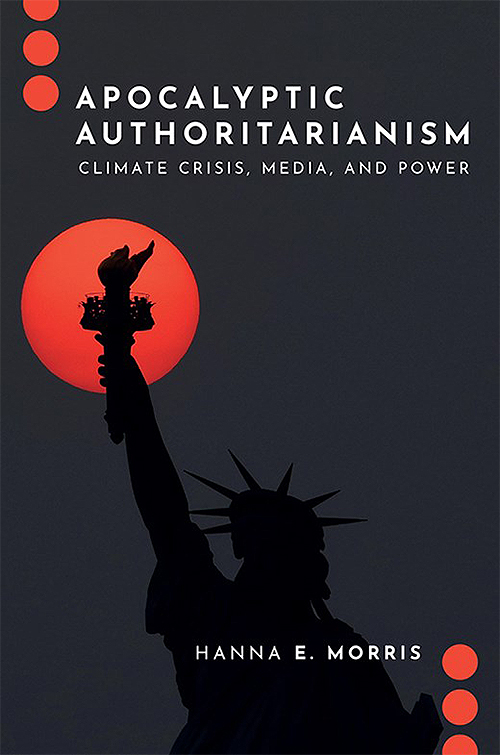2019 was a bad year for the climate — but a good year to be a climate journalist.
Six years ago, as Hanna E. Morris points out, people finally started waking up en masse to the reality of a planet in crisis, and the need to do something about it. Before then, climate journalism focused on arguments over whether climate change was real: at last, the answer seemed settled.
And yet, Morris argues that the opportunity to engage all voices in this universal problem was wasted. Her new book, Apocalyptic Authoritarianism: Climate Crisis, Media, and Power, explores how traditional media outlets — even those deemed to be left-of-centre — have prioritized the views of a narrow group of climate “saviours,” minimizing the efforts of activists, youth and people of colour, particularly women.
Morris is an assistant professor at the Faculty of Arts & Science’s School of the Environment. Her book’s analysis begins close to a decade ago, “when there were a lot of anxieties in the U.S. after Trump’s first election in 2016, around national identity and fears of the future,” she says.
“It was a time when visible threats of climate change were happening in tandem with visible threats to democracy — with the rise of Trump, but also Bolsonaro in Brazil, and of course Putin in Russia and Brexit in the UK.
“An apocalyptic discourse took shape, one that fearmongered about the supposed demise of Western civilization; this led to the legitimization of a new mode of authoritarian politics, where it was perceived that the only people who could solve this so-called total crisis would be privileged figures of power, and any who questioned these traditional authorities were cast as threatening others.”
An example of this exclusion would be the negative press attitude toward New York Representative Alexandria Ocasio-Cortez, whose sponsorship of the “Green New Deal” in 2019 seemed to hold broad appeal as polls showed that a majority of Americans approved of its tenets, which included a reduction in fossil fuels and greenhouse gas emissions.

“And yet, national news coverage at some of the most prominent publications of record started disparaging the policy position, casting it as socialist, threatening and anti-American,” Morris says.
Using a broad array of text and images from news publications including magazines such as Newsweek, Time and the New Republic, Morris shows how business innovation, coupled with a yearning for bygone days, has been given disproportionate attention by those on the climate beat.
This is because traditional media outlets “really have it in their identity to sort of be an almost stabilizing or civilizing force for the nation. Even the publisher of the New York Times, A.G. Sulzberger, really buckled down on this identity in an interview: the need for the paper — which is thought of as a centre-left publication — to counter what was perceived as rising extremism on the part of both the Trump base on the right and young progressives on the left. This created a false-equivalency.”
She adds that regular use of intemperate language — e.g., climate “warriors” — has helped to frame the climate movement as extremist and even violent, rather than positive and necessary.

During her undergraduate years at Berkeley, Morris was actively involved in student journalism and became engaged with the emerging Occupy Movement. It was there that she witnessed firsthand the political and economic pressures facing the profession.
“Increasingly, media was concentrated in fewer hands and there just weren’t many jobs for doing this kind of work. And so I saw academic research as a way to continue writing and doing the kind of investigations that I imagined I would do if I was a reporter.
“I’ve seen the value of teaching too. But my book comes from a real admiration of, and desire for, journalism to be more valued in society: it can be a really important force for changing politics around questions that concern the climate.”
Ultimately, Apocalyptic Authoritarianism is a call to involve all people in this most universal of problems. That includes those with lived experience of climatic tragedies such as wildfires, floods and hurricanes.
“In climate reporting,” Morris says, “there’s this consistent positioning of low-income communities of colour as being the inevitable ones who will die.” Seen merely as victims, she says, their voices remain silenced when climate change solutions are discussed.
“In the eight years between Trump’s first election up until his second one, there needed to be a real reckoning with how authoritarian politics came to define American politics,” she continues. “That reckoning didn’t happen. Unfortunately, it also further entrenched fearmongering about historically marginalized groups, positioning them as entirely threatening on the one hand or passive victims on the other as opposed to legitimate political actors.
“I focus mostly on the U.S., but most here in Canada are concerned about climate change and want to do something about it too. We need to include more people in this conversation.”

